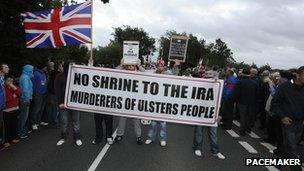EU body withdraws Maze Prison peace centre money
- Published
DUP leader Peter Robinson called the decision 'sensible'
An EU funding programme has withdrawn its offer of £18m in financial support for the peace centre at the former Maze prison in Northern Ireland.
The Special European Programmes Body said it had done so after consulting with the lead partner - the Office of the First and Deputy First Minister.
They said they decided, after the talks, that the centre was no longer viable.
The Maze housed paramilitary prisoners during the Troubles from 1971 - 2000.
Ten republican prisoners died on hunger strike there.
Over the years, the scheme to redevelop the former prison site, near Lisburn in County Antrim, has been controversial.
First Minister Peter Robinson said: "What the SEUPB is doing is the sensible and practical step of ensuring the money doesn't find itself going down some black hole.
"It allows them time to look at other projects and spend the money elsewhere."
He added: "When we looked at the issue of the peace centre we made it very clear that what was required was to get support across the community, that there had to be a broad level of support, and of course if at any time that is achieved then there are other opportunities for funding.
"But at this stage it's very clear that the SEUPB doesn't believe that it's possible to get it within the period of time necessary.
"I don't think there's any difficulty whether it's Europe or whether it's elsewhere that we go for the funding - if there was the level of support that's necessary, I'm pretty sure the funding would fit into place very quickly."
Deputy First Minister Martin McGuinness said on BBC Radio Ulster's Talkback programme that he was disappointed at the withdrawal of funding and added that he had not given up on the project.
"I still hold out hope that at some stage we'll see it constructed at Long Kesh. I will authorise no other projects (apart from Royal Ulster Agricultural Society's move to the site) on that site until people come to their senses," he said.
"What is at the heart of this is power-sharing. From my perspective I want to share power but I can't do it on my own.
"The peace centre is a government commitment which has to be honoured. If it isn't, then it damages the power-sharing project."
The peace money will now be re-allocated to other projects.
Deputy First Minister Martin McGuinness has said he is 'not giving up' on the building of a peace centre.
These will be based in either Northern Ireland or the border counties of the Republic of Ireland.
BBC Northern Ireland political editor Mark Devenport said: "They may have some difficulties finding other projects because it was by far and away one of the biggest projects to be funded by that programme but they are now looking around to see how they can spend that money."
During the summer, First Minister Peter Robinson stalled the plans to build the peace centre as part of the development of the site of the former Maze prison, a decision that caused tension between his party, the DUP, and Sinn Féin.
Mr Robinson said there needed to be a broad consensus on how it would operate and what it would contain - and that is currently absent, in his view.
On Monday, Deputy First Minister Martin McGuinness said there could be no development of the wider Maze site unless it was on the basis of previous agreements about the building of a peace centre.
'No longer viable'
In its statement on Friday, the Special EU Programmes Body (SEUPB) said: "The SEUPB has been in discussions with the lead partner in relation to the viability of the Peace Building and Conflict Resolution Centre.

There were fears the site plans could be seen as a shrine to republican terrorism
"It has been agreed that the project is no longer viable at this time and the SEUPB has therefore rescinded the letter of offer. The SEUPB will now consider the re-allocation of funding to suitable projects."
The European Commissioner for Regional Policy, Johannes Hahn, said: "This is a project which we supported as a contribution to the reconciliation of the communities in Northern Ireland.
"Sadly, due to the political conditions on the ground it cannot go ahead in this period.
"To be meaningful all communities have to be involved - that unfortunately is not the case. I very much hope we can try again with this project and that for the time being the money from it can be used to fund other projects."
Last week, Daniel Libeskind, the architect who designed the proposed peace building and reconciliation centre, said he was convinced the scheme would go ahead.
Ulster Unionist Tom Elliott, who attended a meeting on Friday morning at which the SEUPB made the announcement, said the one thing he took "significant comfort" from was that the £18m would not be lost to Northern Ireland.
He said the SEUPB assured those at the meeting that there were a number of other projects that would be eligible for the funding.
John Armstrong of the Construction Employers Federation (CEF) said it was another blow to the industry.
"Every project that is stalled or scrapped is costing jobs and hindering economic recovery," he said.
- Published4 October 2013
- Published4 October 2013
- Published4 October 2013
- Published4 October 2013
- Published4 October 2013
- Published2 October 2013
- Published30 September 2013
- Published27 September 2013